SAVE THE DATE: Join us on Sunday 26 April to celebrate 150 years of Shephalbury Manor.
Click HERE for our poster and visit www.Facebook.com/CopticCentreUK and www.Twitter.com/CopticCentreUK where more information will be made available soon.
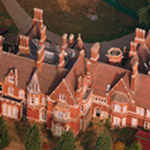
SAVE THE DATE: Join us on Sunday 26 April to celebrate 150 years of Shephalbury Manor.
Click HERE for our poster and visit www.Facebook.com/CopticCentreUK and www.Twitter.com/CopticCentreUK where more information will be made available soon.
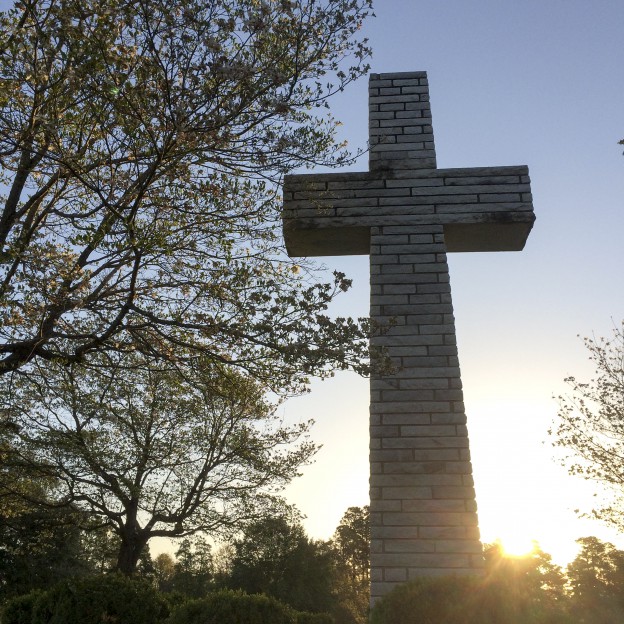
For immediate use
16 May 2014
Coptic Orthodox Church UK
Media and Communications Office
Coptic Orthodox Church (Europe)
Media and Communications Office
Freedom of Faith
Comment by His Grace Bishop Angaelos, General Bishop of the Coptic Orthodox Church in the United Kingdom
The freedom to choose and practice one’s faith is a fundamental right for all under international law, and yet we continue to see numerous tragic cases around the world in which that same right is non-existent, and exercising this freedom is punishable, sometimes even by death.
As Christians we believe that all are created in the Image and likeness of God, with His Image intrinsic to our human nature, which lays the foundation for respect and love for all. Within this nature, we believe that all have been given the freedom to choose and live according to those choices, and while freedom of religion is one choice that is central to the lives of millions across the world, it continues to be widely violated.
As recently reported by Amnesty International, Meriam Yahia Ibrahim Ishag is a Christian Sudanese woman in Sudan who was sentenced “to death by hanging for ‘apostasy’” after refusing to renounce her Christian Faith and convert to Islam, although she has lived as a Christian since her childhood. Meriam, who is twenty seven years old and is eight months pregnant, was reportedly also sentenced to “flogging for ‘adultery’” because her marriage to a Christian man is considered unlawful. This, among other cases, sheds light on the intensity of the struggle facing so many around the world who strive to merely practice their faith.
The recent and deeply-disturbing development of the kidnapped schoolgirls in Nigeria who have reportedly been forced to convert to Islam is yet another incident that has shocked the international community, and in which this brutal violation of this fundamental human right is also causing great distress to families who anxiously await the return of their children.
Egyptian Christians know the effect of religious persecution against numeric minority communities in the Middle East all too well, with the emergence of pockets of intolerant Islamism that have led to more attacks on Christians in the eighteen months following the popular uprising of 2011, than over the twenty years prior. This intolerance has not only affected Christians however, as the first attacks after the uprising were on Sufi shrines, and on a separate occasion Shi’ite Muslims were also senselessly killed in the streets. That said, as Christians we do not live defeated but strive to advocate for all who suffer persecution, oppression and marginalisation, be they Christian or otherwise, man, woman, young or old.
The Baha’i community in Iran is likewise no stranger to religious persecution, and 14 May 2014 marks the sixth anniversary of the imprisonment of seven Baha’i leaders, detained for carrying out ‘peaceful activities on behalf of their communities’.
Here in Britain we pride ourselves on our multi-cultural community that seeks to accommodate and provide for all, and rightly so. We cannot however ignore the fact that, for many across the Middle East in particular, the concept of citizenship, justice and equality are not rights available to everyone, and are very much dependent on a person’s religious affiliation.
We must not forget those around the world who continue to face intense persecution for merely attempting to live out their chosen faith. We also continue to pray and advocate for the rights of these individuals and communities so that this God-given freedom may be exercised within the context of peaceful co-existence and cohesion. This will then ensure a spirit of true reconciliation and acceptance within political states and communities that respect all as equal individuals with equal rights.
*Ends*
View online via The Coptic Orthodox Church Media and Communications Office Website: CopticMediaUK.com
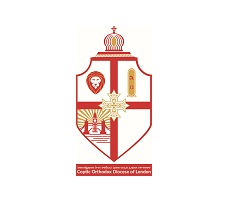
The ground-breaking gift of a senior Iranian cleric to the worldwide Baha’i community is beginning to stir a global conversation about religious co-existence and freedom of religion.
More statements of support for the actions and words of Ayatollah Abdol-Hamid Masoumi-Tehrani have been issued in the United Kingdom and India, and other prominent individuals are offering comments in the Netherlands, Spain, and the United States.
The response comes after Ayatollah Tehrani bravely gave to the Baha’is of the world a calligraphic rendering of Baha’i sacred verses, along with a plea for religious “co-existence”.
In the United Kingdom, Catholic Archbishop Kevin McDonald said in a statement on Thursday: “In interreligious relations it is vital that adherents of different religions come to understand each other more deeply and more sympathetically. This development within the Iranian context is therefore particularly significant and welcome.” Archbishop McDonald is director of the Office for Interreligious Relations of the Catholic Bishops’ Conference of England and Wales.
Also on Thursday in the United Kingdom, Bishop Angaelos of the Coptic Orthodox Church issued a statement praising Ayatollah Tehrani, saying he prays that the promotion of tolerance and co-existence will “become increasingly manifest not only in Iran but across the Middle East and the world.”
“Within the last few years it has become increasingly apparent that one of the most important rights to preserve is that of religious freedom, yet many across the world remain persecuted for their beliefs and are denied that very basic right,” said Bishop Angaelos. “As Christians we believe that God created individuals with a freedom to choose and practice their personal religion and belief, and viewing this as an essential gift we continue to advocate for all who are entitled to this,” he said.
Harry van Bommel, a Member of Parliament in the Netherlands, published news of Ayatollah Tehrani’s actions on his blog, saying: “The action of this Ayatollah is important and does not stand alone. There are a growing number of religious scholars who together form a constructive and principled voice [for religious co-existence] that deserves to be supported and promoted.”
In the Netherlands, prominent journalist and Middle East affairs expert Eildert Mulder has published a column in the newspaper Trouw extolling Ayatollah Tehrani’s action and calling him an “advocate for real freedom of religion or belief”. Ayatollah Tehrani’s gift was a “striking” action aimed at promoting tolerance between the different religions, he said.
In India, Soli Sorabjee, the country’s former Attorney General, and Amitabh Behar, a noted civil society activist, both discussed Ayatollah Tehrani’s actions in terms of minority rights.
Mr. Sorabjee called Ayatollah Tehrani’s words and deeds “courageous” in a land where “minorities have been suffering human rights violations” and discrimination.
“This senior cleric has indeed articulated constructive and principled voice of commitment to religious tolerance and respect for human dignity which is the dire need in the conflict-ridden societies in many nations and states,” said Mr. Sorabjee.
Mr. Behar, who is Executive Director of the National Foundation for India, which works for social justice philanthropy in India, said he hoped Ayatollah Tehrani’s gesture would “create a more conducive environment for minority rights in Iran.”
“[W]e globally see a spurt in intolerance and discrimination against the minorities of all kinds,” said Mr. Behar. “In these times all acts to strengthen a plural and tolerant society and polity are most welcome. We need to celebrate diversity and acts of courage which build a peaceful and just society.”
In Spain, representatives of the humanist movement Comunidad del Mensaje de Silo de Alcala de Henares wrote an open letter to the Iranian Embassy in Spain, praising Ayatollah Tehrani and calling for greater religious tolerance.
“It is clear that from a people in whom Poetry is a value and a perspective on life, one could not hope for more than an act as brave as that which has been done, recognizing universal human values such as equality and respect, regardless of what religion one professes,” wrote Fernando Montalban, Mabel Naya and Marisol Gonzalez.
In the United States, the FaithStreet website published an article by Michael Karlberg, a professor at Western Washington University who has a special interest in constructive resilience, on its OnFaith blog that linked Ayatollah Tehrani’s actions to a list of others who have acted courageously in support of human rights and tolerance.
Ayatollah Tehrani’s “message is urgently needed in Iran and his actions provide a model that should be emulated by growing numbers of thoughtful and courageous Iranians,” said Dr. Karlberg. “[H]is message and his actions are universally relevant. They offer a model of enlightened discourse and enlightened action that deserves support and emulation in every nation where prejudice and intolerance prevail.”
Ayatollah Tehrani’s gift was announced on April 7, 2014, when he posted an image of an illuminated calligraphic work quoting several verses from Baha’u’llah’s Kitab-i-Aqdas, the “Most Holy Book”.
At the heart of the work are the following words: “Consort with the followers of all religions with amity and concord.”
The calligraphic work was accompanied by a three-page statement, which, among other things, said: “I present this precious symbol – an expression of sympathy and care from me and on behalf of all my open-minded fellow citizens who respect others for their humanity and not for their religion or way of worship – to all the Baha’is of the world, particularly to the Baha’is of Iran who have suffered in manifold ways as a result of blind religious prejudice.”
Last week, religious leaders in India and Church of England clerics in the United Kingdom also issued statements of praise for Ayatollah Tehrani’s actions.
There is also a growing discussion in the Arab world about the impact and importance of Ayatollah Tehrani’s actions.
Source: Baha’i World News Service
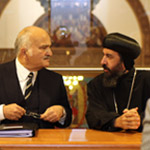
His Royal Highness Prince El Hassan bin Talal of Jordan was received by His Grace Bishop Angaelos, General Bishop of the Coptic Orthodox Church in the United Kingdom, during a historic visit and interfaith gathering at The Coptic Orthodox Church Centre on 13 November 2013.
This visit facilitated a gathering of guests from a variety of faith backgrounds who met in the Cathedral of St George to listen and respond to addresses by Bishop Angaelos and Prince Hassan on the subject of interreligious dialogue and cooperation at an interreligious level.
In welcoming Prince Hassan, Bishop Angaelos, a Scholar-Consultant on the Christian Muslim Forum of England and Moderator of the Churches’ Inter Religious Network, said:
“Having recently celebrated Armistice Day, as the end of war and celebration of all those who gave their lives, the words ‘Lest we forget’ should also be applied to heroes of faith and inclusion. We are a reality in each other’s lives and reconciliation is our only way ahead, both in the Middle East and around the world.
I believe that faith and advocacy are inseparable; a faith that does not advocate is not a Godly faith. This is why we are here with the Cathedral of St George as our backdrop. The altar is the place of our greatest worship and what we are doing here is part of that worship, to be able to integrate our belief with our daily witness in our lives.”
His Royal Highness, who is President of the Foundation for Inter-religious and Intercultural Research and Dialogue, spoke in his address of the need for a strategy to stabilise the Middle East, further indicating the need for a process leading to free and responsible Arab citizenship. Following the address, His Royal Highness answered a variety of questions relating to the rapid decline in the number of Christians in the Middle East and the course of action required to address the increasing challenges facing various faith communities in the region.
During a presentation ceremony following the address, Bishop Angaelos presented His Royal Highness with the gift of a traditional Coptic Orthodox icon of Saint George, after which guests were able to further their conversations during an informal reception.
Resulting from the day’s events was a shared desire to engage more at an interreligious level with the furthered prospect of addressing the state of Christians in the Middle East and the challenges they face.
Among the guests were the Lord Lieutenant of Hertfordshire, Chief Inspector Richard Harbon, The Rt Hon Stephen McPartland MP, as well as representatives of Churches Together in England, Churches Together in Britain and Ireland, the Awareness Foundation, and the Muslim Christian Forum. Also in attendance were members of clergy and community of the Coptic Orthodox Church, and representatives from the broad spectrum of the Christian Church and the Muslim and Baha’i communities in the United Kingdom.
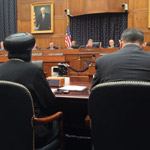
His Grace Bishop Angaelos, General Bishop of the Coptic Orthodox Church in the United Kingdom testified at a Congressional Hearing on ‘Human Rights Abuses in Egypt’ in Washington DC on Human Rights Day, 10 December 2013.
Addressing the congressional panel with four other witnesses, during a Joint Subcommittee Hearing comprised of the Subcommittee on Africa, Global Health, Global Human Rights, and International Organisations, and the Subcommittee on the Middle East and North Africa, Bishop Angaelos underlined the nature and unprecedented level of violence and attacks against minority groups in Egypt pre and post 2011 uprising.
Highlighting a number of incidents occurring in recent months and years, he spoke of the increased incitement that led to the burning, demolition, and attacks on scores of churches, the kidnapping of Christian girls, restrictions on the choice or expression of faith, and the increasing violent attacks resulting in loss of life, and the displacement and destruction of property over decades.
Speaking on behalf of all minorities Bishop Angaelos said:
“I do not only speak as a Christian, because that would be very un-Christian of me. We speak as Christians for everyone, and our view of human rights is for a human rights perspective that covers every person.”
Saying the following regarding the political situation in Egypt:
“What we need to address at the moment are issues of illiteracy and poverty that make constituents vulnerable when they vote and are manipulated, either financially, or in terms of ideology, and of course religion becomes a part of that. What we also need is foreign investment and tourism to bolster the economy and enable people to sustain their families and communities.”
In conclusion, Bishop Angaelos spoke of Christians in Egypt as those who remain loyal to, and take pride in, their indigenous homeland despite the various challenges faced, saying:
“We speak as Christians with hope, and we have faced persecution far greater than this. We are still there as the largest Christian denomination in the Middle East and as the last actual bastion of Christian presence in the region.”
Shortly after the hearing, and in commenting further on the state of minorities in Egypt, Bishop Angaelos said:
“While we do not seek to place blame on the current leadership, it is evident that over the past decades there has been little done to ensure that these violent acts do not reoccur. Since the uprising, and due to a decrease in law and order resulting from the turbulent period under the rule of Mr Mohammed Morsi, there have been increasing challenges facing Christian and minority groups in Egypt. Having said that, and in looking to the future, we continue to support the current process of rebuilding Egypt with a new constitution and ethos, and support the whole community as it calls for change.
We pray, that with the good intention of all to move past these challenging times in Egypt’s history, the implementation of equality before the law will ensure that Egypt becomes a better place for all citizens on the basis that they are Egyptian before anything else, whether they are the numeric majority or minority, man or woman, young or old, secular or religious, Bahá’i, Christian or Muslim.”
Testifying alongside Bishop Angaelos, Mr Samuel Tadros, Research Fellow at Hudson Institute’s Centre for Religious Freedom presented a number of solutions to address the situation in Egypt, saying:
“In order to prevent recurring attacks there must be a process put in place to identify the most vulnerable villages in Egypt that are likely to experience attacks. The Egyptian government should be urged to implement this and the United States may be able to provide resources to help with that process. The Egyptian police also need a security protocol to deal with mob violence and should establish a crisis office within the Egyptian presidency to deal specifically with that issue, as well as the development of a rapid response unit. We also need reform in the legal system, and localised reward and punishment system.”
Other witnesses included:
Zuhdi Jasser, M.D. Vice Chair, U.S. Commission on International Religious Freedom
Morad Abou-Sabe, Ph.D., Professor Emeritus, Rutgers University
Mr. Tad Stahnke, Director of Policy and Programs, Human Rights First
*Ends*
Resources:
Watch the Hearing here: http://1.usa.gov/18P78qK
Transcript and Copy of Testimony submitted to Congress available upon request.
Statement by Bishop Angaelos, highlighting the increasing incitement and violence threatening and claiming the lives of Christians in Egypt. http://bit.ly/1cn7eBf
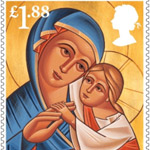
Royal Mail unveils their 2013 Christmas stamp collection featuring a Coptic Nativity icon by Hertfordshire-based iconographer Fadi Mikhail.
The stamp, entitled ‘Theotokos, Mother of God’ depicts the Virgin Saint Mary embracing the Infant Christ. It is an example of the beauty and deeply rooted Faith and culture of the Coptic Orthodox Church, the largest Christian denomination in the Middle East which traces its roots back to the Apostle Mark in the first Century.
Since its establishment in the United Kingdom in the 1960s the Coptic Orthodox community has been increasing in size, and more recently in activity. The Coptic faithful in the United Kingdom are active members of society who contribute to their wider community through a variety of spiritual and social networks and programmes.
His Grace Bishop Angaelos, General Bishop of the Coptic Orthodox Church in the United Kingdom, said:
“This is an opportunity to not only portray the beautiful iconographic heritage of the Coptic Orthodox Church within British culture, but also its theology and teaching with respect to the message of hope and salvation in the Nativity, a Feast that is often transformed into a purely commercial occasion. It also lives as a testimony to the resilience of the Copts, who continue to live their Faith in the birthplace of Christianity and across the world despite the many challenges they have faced in recent months and years.”
Fadi Mikhail, an active youth member of The Coptic Orthodox Church Centre said:
“Coptic iconography was redeveloped in the 1960s and has enjoyed increased international interest since that time. I’m happy that this stamp is helping to elevate that status. Whether it is through art, music, language, or the reconstruction of churches, there is a movement both within and outside Egypt in which Copts are rebuilding themselves for the future, and I see Coptic iconography as a key factor in heralding this movement forward.”
Along with this historic stamp, an icon from the Coptic Orthodox Cathedral of St George depicting St Mary and the Child Jesus, also written by Fadi Mikhail, has been chosen by Christians Aware as part of their Christmas card collection for 2013.